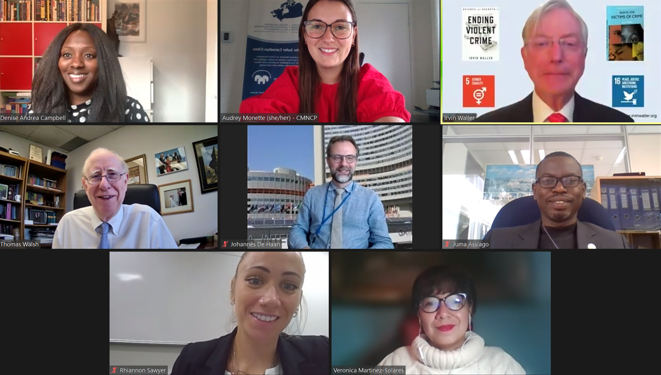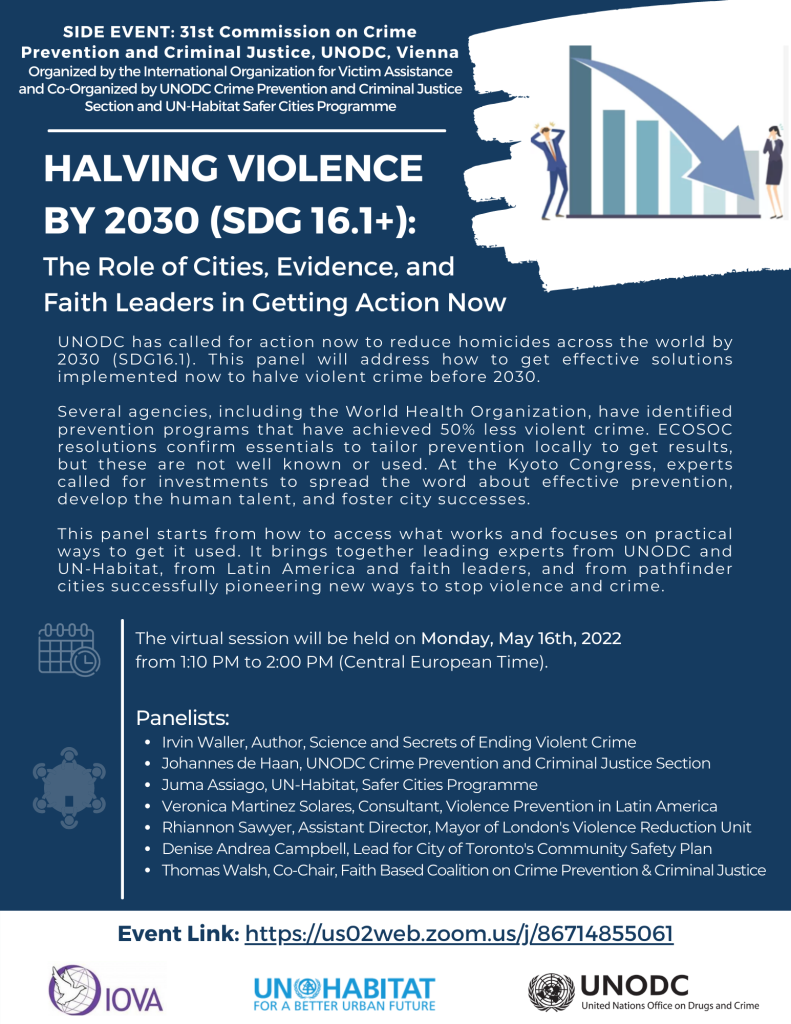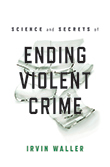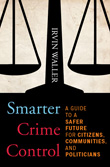HALVING VIOLENT CRIME BEFORE 2030
Leading international experts discussed how to accelerate changes that will halve violent crime before 2030.
The Sustainable Development Agenda calls on States to significantly reduce all forms of violence and related death rates everywhere. Solid science identifies proven solutions that prevent violence before it happens. ECOSOC resolutions, system-wide guidelines, and the Kyoto Declaration confirm the essentials to tailor prevention nationally and locally. Pathfinder cities demonstrate that these essentials have reduced violent crime by 50% within a few years, but they are not well known or used.
Experts at the UN Congress in Kyoto called for investment in accelerators to achieve SDG 16.1:
- Raise awareness to make decision-makers and the public aware of what works
- Train human capacity to plan and implement violence prevention
- Use safety monitor tools to guide decision-makers on science, implementation, and measuring results
- Multiply success stories to network science, guidelines, and pathfinder successes
- Provide adequate and sustained funding for prevention
This panel focused on how to accelerate action by building on ways knowledge and essentials are being used to halve violent crime by 2030. It brought together experts from : UN Office on Drugs and Crime (UNODC) and UN-Habitat Safer Cities Program; Latin America and Faith Leaders; and from two pathfinder cities – London (UK) and Toronto (Canada).
The panel was a side event in May 2022 at the 31st UN Commission on Crime Prevention and Criminal Justice. It was organized by the International Organization for Victim Assistance and Co-Organized by UN Office on Drugs and Crime (UNODC) and UN-Habitat Safer Cities Program.
Speakers
Irvin Waller, Author, Science and Secrets of Ending Violent Crime (opening/moderator) Irvin Waller Slides iwaller@uottawa.ca
Irvin Waller is an Emeritus Professor of Criminology at University of Ottawa. His many publications use research and data to advance policies that prevent crime and help victims. In the 1970´s, he was a senior official in the Canadian government on evidence based policy, including abolition of the death penalty and gun control. He has served on national commissions in Canada, South Africa, United Kingdom and United States He has gained particular recognition for pioneering both the UN General Assembly Resolution on Principles of Justice for Victims, and, international organizations influencing prevention and victim rights in Europe, the Americas and globally. He has a Ph.D. from the University of Cambridge.
- Johannes de Haan, UNODC Crime Prevention and Criminal Justice Section Johannes De Haan Slides johannes.dehaan@un.org
Johannes (Joop) de Haan is the focal point for matters related to crime prevention, assists the UN Commission on Crime Prevention and Criminal Justice, promotes evidence-based prevention at the global level, and supports UN field operations in the development and implementation of relevant programmes in countries around the world. Mr. De Haan has developed a particular focus on community-based crime prevention as well as on the prevention of delinquency amongst youth. Before joining the UN, Mr. De Haan worked for the Organization for Security and Cooperation in Europe (OSCE), both at the Secretariat and the OSCE Mission in Kosovo, as well as for the European Union Rule of Law Mission for Iraq.
- Juma Assiago, Coordinator, UN-Habitat, Global Safer Cities Programme Juma Assiago Slides juma.assiago@un.org
Juma Assiago is an Urbanist and Social Scientist, a graduate in Sustainable Urban Development from Oxford University (UK). He has over 20 years of experience working in programme development and implementation of citywide crime prevention and urban safety strategies in Africa, Latin America Carribean, Asia Pacific and Eastern Europe, as well as developing a Global Network on Safer Cities (GNSC). A key achievement of his work has been supporting member states in the development and adoption of UN systemwide Guidelines on Safer Cities and Human Settlements in 2019. These guidelines influenced the Global Parliament of Mayors to resolve to build a 2030 Agenda vision to half the levels of urban violence by 2030.
- Veronica Martinez Solares, Consultant, Violence Prevention in Latin America Veronica Martinez-Solares Slides vmartinezs00@gmail.com
Verónica Martínez-Solares is an international consultant and member of the boards of directors of the International Organization for Victim Assistance, the Foundation for the Study of Security and Governance of Mexico, and the German Security Forum. She was the lead author of the Regional Model for a Comprehensive Violence and Crime Prevention Policy for Latin America. For Eurosocial. For more than 20 years she has worked on safety, security and justice issues and has worked with the United Nations System, the World Bank, the Inter-American Development Bank, USAID, ICPC, IDRC, EFUS, OIJJ, EuroSociAL, IDLO, the University of Chicago, amongst others, in 20 countries. She has published more than 40 books and articles in 11 countries.
- Rhiannon Sawyer, Assistant Director, Mayor of London’s Violence Reduction Unit Rhiannon Sawyer Slides rhiannon.sawyer@london.gov.uk
Rhiannon is the Assistant Director of the London Violence Reduction Unit: a team of specialists who deliver early intervention and preventative approaches to understand why violence happens. Rhiannon’s role includes ensuring staff develop evidence-based approach which continuously feeds into targeted investment, research & puts the young person’s voice at the heart of everything. Previously, Rhiannon was Head of the national policing Vulnerability Knowledge and Practice Programme, to develop their responses to children & vulnerable adults across gangs, child abuse, drug trafficking, domestic abuse & exploitation. Rhiannon has overseen programmes in relation to child abuse, missing children, refugee children and trafficking. She worked earlier in the youth sector and in the prison and community-based criminal justice system.
- Denise Andrea Campbell, Lead for City of Toronto’s Community Safety Plan Denise Andrea Campbell Slides deniseandrea.campbell@toronto.ca
Denise is the Executive Director, Social Development Finance and Administration Division in Community and Social Services for the City of Toronto. She has oversight for SafeTO: Toronto’s Ten-Year Community Safety and Well-Being Plan adopted by City Council in 2021. The City is taking a bold and different approach to advancing community safety by working collaboratively across sectors, communities and governments. She’s worked in youth development, led the Toronto Strong Neighbourhoods Strategy, and as Director of Community Resources, oversaw the City’s neighbourhood revitalization, Tower Renewal, community development, and community funding portfolios. She holds degrees from McGill, Ottawa and Toronto.
- Thomas Walsh, Co-Chair, Faith Based Coalition on Crime Prevention & Criminal Justice Thomas Walsh Slides twalsh@upf.org
Thomas Walsh is Chairman of the Universal Peace Federation and Co-Chair of the Coalition of Faith-Based Organizations on Crime Prevention and Criminal Justice. Dr. Walsh is Vice Chair of the International Council of the World Association of Non-Governmental Organizations. He has been a university trustee, teacher, author and editor, contributing to more than twenty books related to interfaith, peacebuilding and renewal of the United Nations; among these volumes are Renewing the United Nations and Building a Culture of Peace and The Millennium Declaration of the United Nations: A Response from Civil Society. He earned his Ph.D. at Vanderbilt University.
- Audrey Monette, Director of Projects and Research for the Canadian Municipal Network on Crime Prevention. (opening/coordinator) Introduction audrey@safercities.ca
Audrey Monette leads projects, for the Canadian Municipal Network for Crime Prevention, related to community safety and well-being (CSWB), including facilitating training sessions, conducting research, and developing CSWB plans. Audrey advocates to end gender-based violence, to prevent victimization, and to improve victims’ and prisoners’ rights. She is part of an informal team from the University of Ottawa, where she leads knowledge mobilization initiatives. Audrey is passionate about community-led approaches to safety and well-being that are rooted in equity, social justice, and dismantling systems of oppression.
_________________________________________________________
RELATED INFORMATION:
Short Video: Accelerator Actions Needed Now to Use Proven Solutions, Guidelines, and Success
(below is text of video in bullet form prepared by Audrey Monette and Irvin Waller)
Governments Agreed to Reduce Violent Crime
In 2015, governments agreed to reduce violent crime significantly by 2030 (Sustainable Development Goal 16.1), but they are not yet making necessary and affordable transformations.
Violent Crimes Cause Too Many Tragedies Globally
- Half a million lives lost to homicide
- Unknown millions tragically injured and disabled
- 25 million women plus traumatized and impacted by rape
- Trillions of dollars of GDP sacrificed to violent crime
Violent Crime Can Be Halved by Prevention Before 2030
Fifty years of scientific experiments identify programs that halve violent crime in less than five years. These proven programs are accessible on websites from key agencies, such as the World Health Organization.
Proven Solutions Include
- Outreach to young men engaged in violence, including in emergency rooms
- Changing community norms to what does not support gender-based violence
- School curricula to increase self management to stop violence
- Employment and mentoring of young men
Tackling the Root Causes of Crime Takes Time
National commissions and research findings show how violence will be reduced over long term by tackling poverty, school failure, family violence, access to guns, and over use of policing and incarceration.
UN Guidelines Identify How to Succeed
ECOSOC and UN-Habitat guidelines agree on how to tailor the science to local conditions, including:
- Implement prevention planning unit
- Diagnose, plan, implement, evaluate
- Mobilize social services, health, schools, employment, police, and other key sectors
- Dedicate adequate and sustained funding
Cities Demonstrate Halving Violence
Success stories such as Bogotá and Glasgow reduced violence by 50%. Safer cities are building on success, including Córdoba, London, and Toronto.
Accelerator 1: Raise Awareness
Make decision makers and the public aware of what works
Accelerator 2: Train Human Capacity
To plan and guide violence prevention from national governments to cities
Accelerator 3: Use Safety Monitor Tools
To guide decision makers on science, implementation, and measuring results
Accelerator 4: Multiply Success Stories
Network science, guidelines, and pathfinder successes
Accelerator 5: Invest in Prevention
Provide adequate and sustained funding for prevention that stops violent crime before it happens
Action Now. Thoughts and Prayers are not Enough.
It is time for national governments, international agencies, and foundations to invest in accelerators to transform the way to stop violence.
Additional Sources
Further information on the sources of evidence, examples of proven prevention that gets results within a few years, and the growing consensus on how to tailor proven strategies nationally and locally is available in Science and Secrets for Ending Violent Crime and in Spanish.
Governments agreed to the Kyoto Declaration in 2021 that stresses the importance of advancing prevention.
Other sources will be added here in due course.



